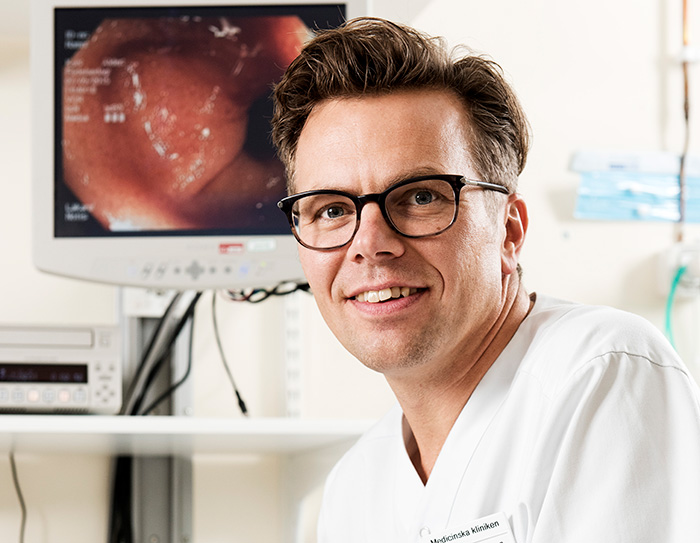
New personalized treatment for IBD
Inflammatory bowel disease, IBD, is a serious illness that affects thousands of people in Sweden. Jonas Halfvarsson leads a research project that will develop more personalized treatments for IBD. The research is conducted in close collaboration with healthcare, and has already resulted in new treatments.
In Sweden, about 3,000 individuals are diagnosed with IBD every year, and the total number of patients is approaching 100,000. Furthermore, the illness is increasing among young people and the elderly. The reason behind this is unknown, but research suggests that diet may be a factor.
The disease can cause major problems, and the symptoms usually consist of diarrhea, which can come on suddenly, but can also amount to stomach pain, blood in the stool, weight loss and fever. It can lead to lifelong medication, hospital stays, recurrent sick leave and, frequently, a need for surgical procedures.
Affected people usually fall ill when they are 15-35 years old. This leads to high human and societal costs, as these people have serious issues and need consistent medical care for long periods of time.
Early and personalized treatment
Jonas Halfvarsson is professor of gastroenterology at Örebro University, and researches Crohn’s disease and ulcerative colitis, the most common forms of IBD. He also leads the Nordic project Nordtreat, which will develop an individualized treatment for IBD in particular.
– These diseases are major concerns. We have insufficient tools to identify who might develop the illness. We lack simple criteria for making a diagnosis and have limited opportunities to predict how things will turn out for the individual patient.
Jonas Halfvarsson tries to identify biological markers that are specific to the illnesses. For example, the markers can be proteins or specific parts of the genome.
– We then want to use these markers to be able to predict who will get the disease, how serious it will be, and how the person will respond to different treatments.
The goal is to be able to start a treatment earlier in the illness that is really adapted to that particular individual. This is also something that is already being implemented in clinical practice, where patients who are at risk of having a serious course of the disease should receive strong medication from the beginning, unlike today’s treatment, where treatment is gradually intensified if patients don’t improve.
”Without samples we won’t get anywhere”
Biobanks are a critical resource for Jonas Halfvarsson’s research.
– The biobanks form the basis for this type of research. Without collected samples, we will get nowhere.
The samples from the biobank mean they can, for instance, look for the markers in samples patients provided before they became ill, and compare these with newly collected samples.
– We use existing biobanks, both ‘population-base’ and specific biobanks, such as the unique Swedish twin registry. In addition, I also lead national studies where we establish sample collections that are specifically designed with these issues in mind.
Major benefit to both conduct research and work as a doctor
In addition to his research, Jonas Halfvarsson is chief physician in this area, and is clinically active at the Örebro University Hospital.
– It is a bit of a challenge to combine the two roles. But it also gives me a fantastic sense of joy. The two roles enrich each other, as I can bring my experiences from my clinical activities to the research and vice versa, in a way that makes both jobs more interesting and exciting. So, it is a great privilege to be able to combine them. But the day only has 24 hours, so of course certain compromises have to be made.



